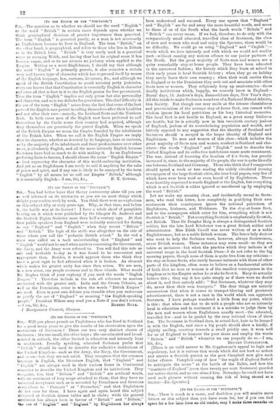(TO THE EDITOR OF THE SPECTATOR:1
SIR,—You had better leave that thorny controversy alone till you are as well informed on its intricacies as you are on most things which delight your readers week by week. You think there were no explosions on this subject fifty or sixty years ago. Why, at that time, and before it, the battle was at its fiercest ! I have a whole sheaf of pamphlets bearing on it which were published by the Glasgow St. Andrews and the Scottish Rights Societies more than half-a-century ago. At that time public speakers from England were instantly corrected for daring to say " England " and " English " when they meant " Britain " and " British." The logic of the strife was altogether on the side of those whom you call the "pedantic British schooL" In the end a truce was called on a tacit unclerstanding that " England " and " English " would not be used when matters concerning the Government, the Navy, and the Army were referred to. You will find this rule as safe and workable to-day as it was found to be convenient and appropriate then. Besides, it would appease those who think they have a good right to feel affronted when it is broken. An element which makes for greater unity has since then arisen. We are now, In a new sense, one people overseas and in these islands. What would Mr. Hughes think of your euphony if you used the words "English Empire " ? Therefore include in the rule all reference to matters connected with the greater unit. India and tho Crown Colonies, as well as the Dominions, come in when tho words "British Empire" are used. Even in your own defence you stumble when you endeavour to justify the uso of " England " as meaning " ths English-speaking people." President Wilson may send you a Note if you don't retract.
—I am, Sir, &e., ROBERT RULE. 7 Montgornerie Crescent, Glasgow.










































 Previous page
Previous page